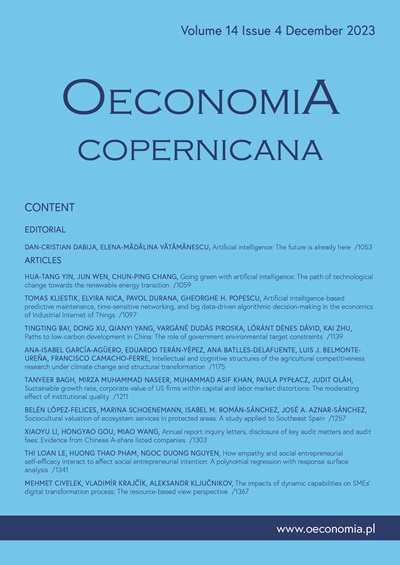对比特币收益每日影响的新视角:来自每小时事件研究方法的证据
IF 10.8
1区 经济学
Q1 ECONOMICS
引用次数: 0
摘要
研究背景:目前的一系列金融文献都集中在检测加密货币市场的低效率,例如星期几效应。然而,这些研究并没有考虑到这个市场没有每日收盘,并且有可能持续交易加密货币。这一事实可能导致了先前实证结果的偏差。文章的目的:我们建议从另一个角度分析比特币的周中效应,即一天中的每小时数据都被视为一个事件。为了实现这一目标,我们采用了比特币的每小时收盘价,这些收盘价取自2016年1月至2021年12月期间世界领先的加密货币市场交易所和交易平台之一Kraken交易所。方法:与之前的经验证据相反,我们不计算每日回报,相反,我们提出的方法的第一阶段致力于分析一周中每一天每天24小时的每小时平均回报率。我们寻找具有统计意义的每小时平均回报,这可能会提高比特币市场每小时差异化的重要性。在第二阶段,我们计算不同的事件后累积回报,这些回报被定义为日志价格在一段时间内的变化。最后,我们简单地根据我们获得的显著小时平均回报提出了不同的投资策略,并根据夏普比率评估了它们的表现。调查结果和附加值:我们参与了关于比特币程度的辩论?通过提供一种基于每小时事件研究方法的替代方法来提高市场效率。此外,我们提供的证据表明,通过投资不同的事后小时窗口,有可能跑赢经典的买入和持有策略。本文章由计算机程序翻译,如有差异,请以英文原文为准。
A new perspective of the day-of-the-week effect on Bitcoin returns: evidence from an event study hourly approach
Research background: A current strand of the financial literature is focusing on detecting inefficiencies, such as the day-of-the-week effect, in the cryptocurrency market. However, these studies are not considering that there are no daily closes in this market, and it is possible to trade cryptocurrencies on a continuous basis. This fact may have led to biases in previous empirical results.
Purpose of the article: We propose to analyse the day-of-the-week effect on the Bitcoin from an alternative perspective where each hourly data in a day is considered an event. Focusing on that objective, we employ hourly closing prices for Bitcoin which are taken from the Kraken exchange, one of the world leading exchanges and trading platforms in the cryptocurrency markets, for the period spanning from January 2016 to December 2021.
Methods: Contrary to the previous empirical evidence, we do not calculate daily returns, but rather the first stage of our proposed approach is devoted to analysing the hourly mean returns for each of the 24 hours of the day for each day of the week. We look for statistically significant hourly mean returns that could advance the importance of the hourly differentiation in the Bitcoin market. In a second stage, we calculate different post-event cumulative returns which are defined as the change in log prices over a time interval. Finally, we propose different investment strategies simply based on the significant hourly mean returns we obtain and we evaluate their performance in terms of the Sharpe ratio.
Findings & value added: We contribute to the debate about the degree of Bitcoin?s market efficiency by providing an alternative methodology based on an event study hourly approach. Furthermore, we provide evidence that by investing in different post-event hourly windows it is possible to outperform the classic buy-and-hold strategy.
求助全文
通过发布文献求助,成功后即可免费获取论文全文。
去求助
来源期刊

Oeconomia Copernicana
ECONOMICS-
CiteScore
13.70
自引率
5.90%
发文量
26
审稿时长
24 weeks
期刊介绍:
The Oeconomia Copernicana is an academic quarterly journal aimed at academicians, economic policymakers, and students studying finance, accounting, management, and economics. It publishes academic articles on contemporary issues in economics, finance, banking, accounting, and management from various research perspectives. The journal's mission is to publish advanced theoretical and empirical research that contributes to the development of these disciplines and has practical relevance. The journal encourages the use of various research methods, including falsification of conventional understanding, theory building through inductive or qualitative research, first empirical testing of theories, meta-analysis with theoretical implications, constructive replication, and a combination of qualitative, quantitative, field, laboratory, and meta-analytic approaches. While the journal prioritizes comprehensive manuscripts that include methodological-based theoretical and empirical research with implications for policymaking, it also welcomes submissions focused solely on theory or methodology.
 求助内容:
求助内容: 应助结果提醒方式:
应助结果提醒方式:


